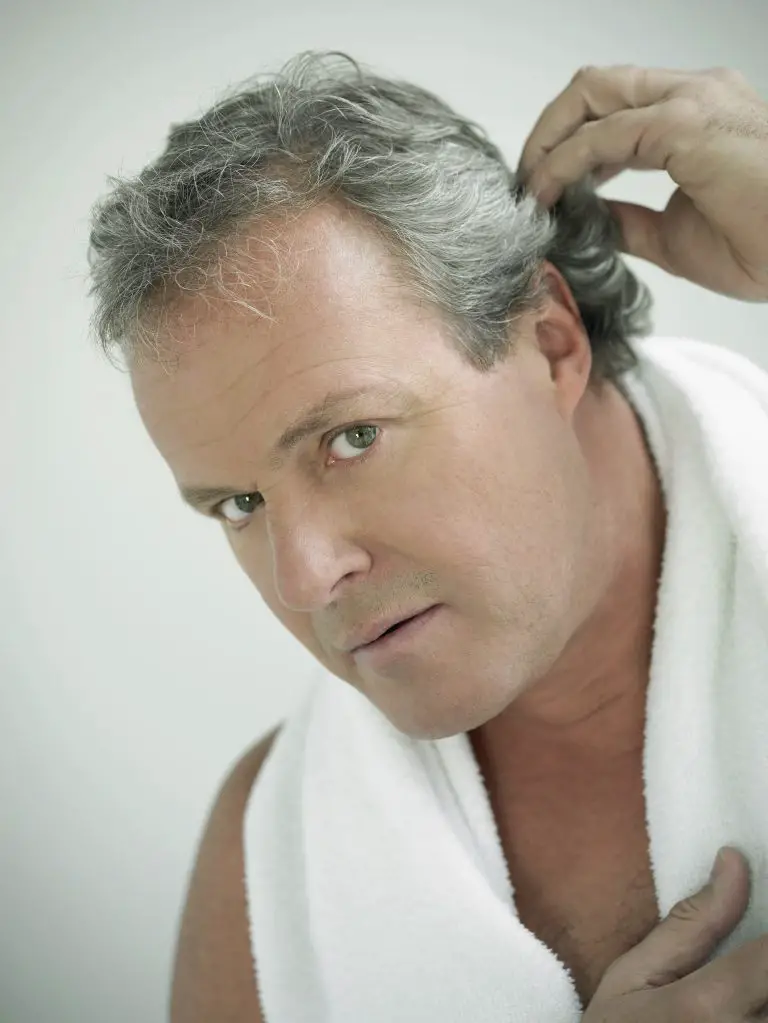
Page Contents
There are far too many things that cause gray hair to list them all. Between different diseases such as hyperthyroidism and different medications that can cause you to gray, it can be quite concerning that you will go gray far too early.
Sometimes gray hair, especially just a little around the edges, can make you look more mature. However, more often, gray hair is not something that you are looking forward to. Knowing what the two main causes are for gray hair is the first step in being able to find ways to combat them.

More About Your Grays
Hairs that turn gray one by one is a natural part of aging. The part of your hair follicles that gives your hair its color is something called melanin. Your melanin is stored at the bottom of your hair follicles in melanosomes.
While your body does make some of your melanin itself, for the most part you are simply using what you have stored. Therefore, once you run out of stored melanin, you are literally out of color for your hair.
Without the melanin, the strands of your hair have no color and are white. Sometimes your hair may seem to turn to gray first, but that is just an illusion. If your hair is naturally dark, then the white hairs will reflect just a little of the color around them, making them seem to be gray instead of white.
Some people are born with more melanin stored in their hair follicles than other people are. Also, some people use up their melanin at a faster rate than other people do. Some of both of these are affected by your genetics.
The important fact to remember is that you need melanin to avoid gray hair. Therefore, the things that use up your melanin, prevent your melanin from working, or that prevent you from making your melanin are the things that you want to avoid if you do not want to turn gray early on in your life.
On that same note, the things that help you save your melanin also help the health of the part of your hair follicles that makes your melanin and gives your body what you need to make it are the things that you are going to want to do to avoid those grays.
Stress And Gray Hair

If you have ever been seriously stressed at some point in your life, you probably know that stress can cause a lot of problems for you both emotionally and physically. Some of the more common side effects that you are probably familiar with are headaches, mood swings, and general irritability.
There are varying degrees of stress, but the higher amount of stress you are experiencing, the greater the risk is that you will experience a bad side effect, and the worse that side effect is likely to be.
One thing that stress does if the level is high enough is that it can make your body produce some adrenaline. Adrenaline is made for ‘fight or flight’ situations, and it does a variety of things in your body. This hormone is bad for your hair and burns through your stored melanin at a very fast rate.
One thing that even mild stress is known for doing sometimes is making your hair thin out. You may notice more hair coming out when you brush if you are stressed. This extra shedding is because your hair is triggered to start its falling out stage.
Every hair cycle that you go through, your hair is more likely to come back in without color. This is even more so after a stressful event. Chemotherapy is a perfect example of this since many people – even young people – who lose their hair from chemo often show much more gray when their hair finally does come back in.
Part of the reason for this is that chemotherapy is very stressful for your body. Usually, if you are getting chemotherapy, you are also going to be stressed mentally and emotionally as well. This being the case, it should come as no surprise that it can make you gray sooner.
What You Can Do About Stress

Since stress is so bad for your melanin, if you want to avoid those gray hairs, you should try to avoid getting stressed. Sometimes it is entirely possible to avoid situations that you know tend to stress you. This can be as simple as reminding yourself not to wait until the last minute to finish that project you know is due.
However, sometimes there is no way to avoid the things that stress you. Perhaps it is a certain coworker or family member. If this is the case, you should find ways to cope with the stress. The options for de-stressing are practically limitless.
Many people find hobbies to be relaxing. Coloring is one that has been proven to be relaxing for you, but that is just one example. Other options for hobbies that help you deal with stress include, but are not limited to: beekeeping, playing a musical instrument, dancing, etc.
Even if you don’t have time for hobbies, you still have options available. Getting a massage is often quite relaxing, and it is good for your muscles. Even something as simple as drinking a cup of an herbal tea or listening to some soothing music might be all you need to relax. If you have to work through your stress, try a stress ball or something similar.
Sometimes if you have a vitamin deficiency it can lead to you feeling stressed easily, so you should keep this fact in mind and get your vitamin levels tested if this seems to be a problem. Also, sleep all on its own can be a blissful remedy for stress.
If you struggle to sleep when you are stressed, then this may make your stress even worse. In this case, you can take something like melanin to help you sleep better.
Genetics And Gray Hair
Your genetics plays a large part in a number of different things in your body, of which your hair is only one. What genetics you have are affected the most by the genetics that you get from your parents. However, your genetics go back much further than that.
Your ethnicity is tied quite closely to your genetics too, and can play a surprisingly large part in your hair. Ethnicities that have light skin and hair tend to have less melanin stored in them. Caucasians, therefore, start off with less melanin and run out soonest.
On the other hand, ethnicities that have dark skin and dark hair have a lot of melanin stored in their bodies. This is why people of African descent do not gray until years later than the average Caucasian. Asians are also genetically prone to graying later.
On average, Caucasians start to gray sometime in their 30’s with Asians usually not starting until their late 30’s. Meanwhile, those of the African ethnicity do not tend to start graying until they are in their 40’s.
However, there are some exceptions to ethnicity. Some family lines can gray particularly early, while others do not gray until much later on in their lives.
To determine when you should naturally start graying, look at both your ethnicity and at when the people on both sides of your family tree started to gray. Average out these numbers and you should have the age at which you can expect to go gray yourself.
What You Can Do About Genetics
While you cannot change the genetics that you are born with, that does not mean that it is hopeless. There are things that you can do to help fight against your genetics so that you can keep your hair color.
This includes all of the latest inventions that have been made, such as laser light therapies, and all of the other things that have come out. These treatments can be divided into two categories: things that you have to take internally and one that you apply or use externally.
Internal options come in the form of pills which can work in a variety of ways. Sometimes these pills give you everything you need to make melanin so that you do not run out of melanin as quickly. Others use catalase to break down the naturally occurring hydrogen peroxide that tends to bleach your hair as you get older.
External options include anti-graying serums that you put on your hair. These can be hair masks, creams, and some homemade hair treatments of all kinds. Even massaging your scalp to stimulate the flow of blood to your hair follicles is something that can help your hair a little.
Finally, the simplest option when it comes to fighting against your genetics is simply to take good care of yourself. Get enough sleep, avoid stress, and take a daily vitamin to make sure that you are getting all you need.
While you will still gray while doing these things, if you are healthy, then you are less likely to gray quickly. The earlier on in life you start taking care of yourself, the more likely you are to see an actual difference. Don’t wait until you are already seeing gray hairs before you start doing something about them.
A Few Other Causes Of Gray Hair
As mentioned, there are other causes of gray hair besides these two main reasons. The one that I briefly hinted at was hyperthyroidism, which has a known side effect of causing hair to gray. Another cause behind gray hair can be vitamin deficiency if you are missing the vitamins that your body needs to make melanin.
Vitiligo is a pigmentation disorder that most often affects your skin. It is essentially a malfunction of the cells that make your melanin, which prevents them from making any melanin at all. This makes your skin in the areas affected perfectly white. However, it can affect your scalp too, making your hairs in that area white.
Alopecia Areata is another disorder and one that primarily affects your hair. It runs in families and tends to affect middle-aged people more so than any other age group. The main symptom is losing your hair in patches fairly suddenly.
Even though the hair does grow back, it often comes back grey. What can be worse about this autoimmune disorder is the fact that it seems to target the areas of your hair that are the darkest, causing them to come back in gray and making your hair look splotchy.
In fact, having any autoimmune disease at all can make you gray faster. There a variety of reasons why autoimmune diseases can affect your hair. Basically, they can either affect your hair directly, indirectly or both.
An autoimmune disease like Alopecia Areata affects your hair directly by making it fall out. On the other hand, other autoimmune diseases can make you gray indirectly by decreasing your immune system’s ability to fight off sickness. This, in turn, makes you sicker more often and it stresses your body out. This stress then makes you gray.

Final Thoughts
As you can see, though going gray is inevitable, there is still hope that you can postpone this event just a little longer. Staying healthy and getting the vitamins you need is vital to making your melanin. Certain proteins in particular are needed to make up your hair.
Smoking, and other bad habits like drinking, can cause all sorts of problems too, including making you gray sooner either directly or indirectly if you get some form of cancer and have to go through chemotherapy because of it.
In short, anything that makes your hair fall out also makes you that much more likely to end up with a few new gray hairs when they start growing back out again. This includes putting a lot of chemicals on your hair to style it.
Even simply putting your hair into styles that tend to pull out a few hairs can add up over time. These styles can damage your hair follicles too, which means that your hair may end up both wiry and rough as well as gray.
When your hair starts to gray, you may decide that the salt and pepper look makes you appear dignified. However, if you cannot prevent those grays from popping up and you don’t like the way they look on you, there is always to option to dye your hair.
Just keep in mind that dying your hair will use chemicals that your hair does not always appreciate, meaning that you may gray just a little faster if you try to hide your gray.







